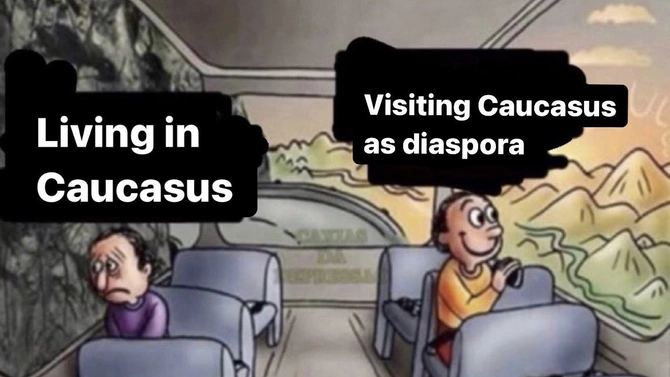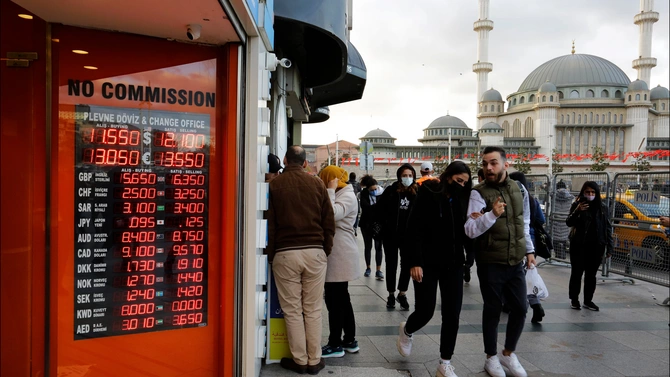
Sociologist Sanam Vaghefi notices a lot of tension between expatriates from the Caspian area and people who choose to stay in the "old country." Why do diaspora communities romanticize their homeland, while locals idealize life abroad?
Is the grass really greener on the other side? Image: Alexey Stiop/Shutterstock
As a sociologist who grew up in a multilingual migrant household, I have always been fascinated by languages. I’m especially intrigued by proverbs shared across continents by seemingly very different cultures. For example, apparently, “the neighbour's grass is always greener” regardless of who that neighbour is. In Turkish and Farsi, it’s not the colour of the neighbour’s grass that matters, but the fact that their “chicken seems like a goose.” In Azerbaijani, it is that “the stranger’s crow is a hawk,” but the underlying meaning of the sayings remains the same. Perhaps it is simply a universal attitude: we perceive other peoples’ lives and conditions as better than our own.
I recently came across an anonymous meme that made me think about how this proverb applies to our approach to living in the countries that we do. It comes in hundreds of versions, but all are based on a cartoon by Brazilian cartoonist, Genildo Ronchi, showing two men on opposite sides of a bus. The tired and miserable one sees nothing but drab rock outside the window, while the happy one looks out across a beautiful landscape. The former represents “living in the Caucasus.” The latter, our happy fellow, is the one “visiting it from the Diaspora.”

Of course, this comparison is an overgeneralization. Not all Caucasian diasporas have the same kind of relationship with their homeland. Nor does the example cover the gendered ways we experience social interactions, safety, and individual freedom in different places.[1] However, in this article, I do not intend to analyze the meme itself, nor to compare different Caucasian diasporas. Rather, I’d like to start an overdue dialogue (or perhaps monologue) about diaspora members and locals, about those who romanticize their homeland and those who idealize living abroad (aka in ‘the West’[2]).
Remembering the cross-linguistic popularity of “the neighbour’s grass,” perhaps it doesn’t seem surprising that we usually have highly optimistic impressions about countries that we don’t live in. However, what makes this worth discussing are the tensions fueled by comparisons between life in “the homeland” versus life “abroad.” As someone who has been in the roles of both the “admiring, naive visitor” and the “frustrated local” at different points in my life, I can say that these tensions are almost always politically loaded, even when they’re not intended to be. Of course, neither of these sentiments or tensions are specific to the Caucasus.
A striking case is Turkey which has a large diaspora in Western Europe. Once temporary ‘guest workers’ in Germany who worked exhausting jobs to send money home, the Euro-Turks have recently become the collective subject of anger and hostility in Turkish dissident social media. As the Turkish Lira continues to lose value against the Euro, the interactions between locals and diasporic visitors appear to become more frequently hostile. Last year, after hundreds of thousands of European diaspora Turks visited Turkey as tourists, social media blew up with reactions against their approach to Turkey. The reactions range from bitter sarcasm and mocking of their frequent claims about ‘how great the Turkish economy is’ to a frustrated critique of their justifications for not permanently settling in Turkey. These critiques are sometimes accompanied by calls for campaigns to deprive diaspora members of the right to vote in Turkey. The extent and legitimacy of migrants’ political participation in their home country’s affairs is a complex topic, and I lack the space to expound on it here.

But regardless of the country-specific context about politics and economy, there lies a global truth in such interactions: being a migrant is hard. Migration is an ongoing journey that continuously shatters and recreates our identities, and it’s more often than not paved with racism, discrimination, and a sense of powerlessness. The diaspora tourists who visit Turkey to spend their Euros today are the same ‘Turks’ whose homes were set fire to by neo-Nazis less than 30 years ago, and it’s no wonder that 1970s Turkish pop culture is filled with movies and songs referring to Germany as the ‘bitter land.’ Even if the severity of such experiences varies greatly, all South-to-North migrants have stories of some kind of loss. Some have lost loved ones. Others lost the respect they once had through social status. Something as simple as one’s name can prove an unexpected loss in a land where nobody can pronounce it. In the words of civil rights lawyer and best-selling author Qian Julie Wang, “the heartbreak of one immigrant is never that far from that of another.”
More often than not, our mental images co-exist as pairs of opposites. That is, if there is a ‘bitter land’ filled with loss and hardship, there’s sure to be a ‘dream land’ too, existing somewhere far away. For many diaspora members, particularly those who have spent their lives as migrants, that ‘dream land’ is their homeland. Yet, the situation is reversed for locals who struggle with their own country’s daily life challenges. The home country feels like the ‘bitter land’ and Germany, Canada, or the USA are seen as the ‘dream.’ It’s precisely this paradox that makes locals feel that their experiences are overlooked and invalidated by diaspora visitors’ appraisals of their home country.
Migrants’ impressions of their home countries are no longer based on lived experience. At the same time, locals’ admiration of ‘life abroad’ is constantly supported by orientalist portrayals of Western superiority through media and academia. Even so, neither of these sentiments will stop in the foreseeable future. Many diaspora migrants emotionally and politically invest in the ideas of returning to their homelands, while their local compatriots dream of moving to the West. One way to ease the tension would be to practice mutual empathy and understanding. However, no one seems ready to pause and listen to the other's story in the exhausting chaos of daily life challenges. Perhaps until then, the men on the bus in our cartoon could try switching seats to see how it feels to see their neighbour’s ‘grass’ from each other’s window.
[1] Many other dimensions of our identities, such as sexual orientation and dis/ability status affect how we perceive and experience a new place, although the scope of this article is too limited to cover them.
[2] Here, ‘abroad’ almost always refers to the West. Even though several places in Asia, including the Emirates, Russia, and Kazakhstan also receive a large number of migrants, admiration often targets only North America and West Europe. Therefore this article also refers to South-to-North migration.
Share on social media